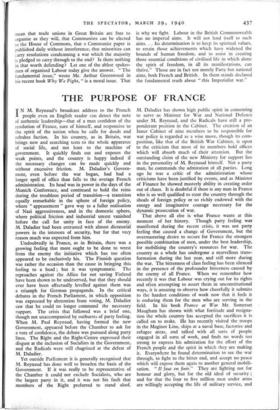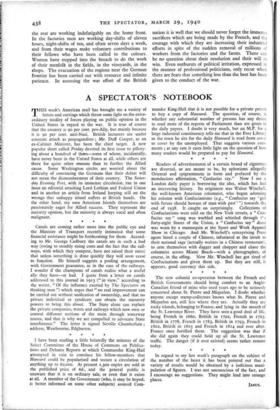THE PURPOSE OF FRANCE
IN M. Reynaud's broadcast address to the French I people even an English reader can detect the note of authentic leadership—that of a man confident of the resolution of France, sure of himself, and responsive to the spirit of the nation when he calls for deeds and rebukes faction. In his country, as in Britain, war brings new and searching tests to the whole apparatus of social life, and not least to the machine of government. It quickly finds out and exposes the weak points, and the country is happy indeed if the necessary changes can be made quickly and without excessive friction. M. Daladier's Govern- ment, even before the war began, had had a longer spell of office than falls to the average French administration. Its head was in power in the days of the Munich Conference, and continued to hold the reins during the troublous period of transition—a transition equally remarkable in the sphere of foreign policy, where " appeasement " gave way to a fuller realisation of Nazi aggressiveness, and in the domestic sphere, where political friction and industrial unrest vanished before the call for unity in face of the enemy. M. Daladier had been entrusted with almost dictatorial powers in the interests of security, but for that very reason much was expected from him.
Undoubtedly in France, as in Britain, there was a growing feeling that more ought to be done to wrest from the enemy the initiative which has too often appeared to be exclusively his. The Finnish question was rather the occasion than the cause in bringing this feeling to a head ; but it was symptomatic. The reproaches against the Allies for not saving Finland have been shown to be undeserved, but that they should ever have been effectually levelled against them was a triumph for German propaganda. In the critical debates in the French Parliament, in which opposition was expressed by abstention from voting, M. Daladier saw that he could no longer command the necessary support. The crisis that followed was a brief one, though not unaccompanied by outbursts of party feeling. When M. Paul Reynaud, having formed the new Government, appeared before the Chamber to ask for a vote of confidence, the debate was pursued along party lines. The Right and the Right-Centre expressed their disgust at the inclusion of Socialists in the Government, and the Radicals were still chagrined at the defeat of M. Daladier.
Yet outside Parliament it is generally recognised that M. Reynaud has done well to broaden the basis of the Government. If it was really to be representative of the Chamber it could not exclude Socialists, who are the largest party in it, and it was not his fault that members of the Right preferred to stand aloof.
M. Daladier has shown high public spirit in consenting to serve as Minister for War and National Defence under M. Reynaud, and the Radicals have still a pre- ponderant position in the Cabinet. The creation of an Inner Cabinet of nine members to be responsible for war policy is regarded as a wise move, though its com- position, like that of the British War Cabinet, is open to the criticism that most of its members hold offices which will absorb much of their attention. But the outstanding claim of the new Ministry for support lies in the personality of M. Reynaud himself. Not a party man, he commands the admiration of all parties. Long ago he was a critic of the administration whose criticisms have been justified by events, and as Minister of Finance he showed masterly ability in creating order out of chaos. It is doubtful if there is any man in France who is so well qualified to steer the country through the shoals of foreign policy or .so richly endowed with the energy and imaginative courage necessary for the dynamic prosecution of war.
That above all else is what France wants at this moment of her history. Though party feeling was manifested during the recent crisis, it was not party feeling that caused a change of Government, but the overmastering desire to secure for France the strongest possible combination of men, under the best leadership, for mobilising the country's resources for war. The country as a whole has undergone a marvellous trans- formation during the last year, and still more during the war. The bitterness of class feeling has been silenced in the presence of the profounder bitterness caused by the enemy of all France. When we remember how recently it was that Labour was crying out for its rights and often attempting to assert them in unconstitutional ways, it is amazing to observe how cheerfully it submits to the hardest conditions of work now that it feels it is enduring them for the men who are serving in the field. In his book France at War Mr. Somerset Maugham has shown with what fortitude and resigna- tion the whole country has accepted the sacrifices it is called on to make. He has recently visited the troops in the Maginot Line, ships at a naval base, factories and refugee areas, and talked with all sorts of people engaged in all sorts of work, and finds no words too strong to express his admiration for the effort of the French people and the spirit in which they are making it. Everywhere he found determination to see the war through, to fight to the bitter end, and accept no peace which will expose them again to another general mobili- sation. "II faut en finir." They are fighting not for honour and glory, but for the old ideal of security ; and for that the four to five million men under arms are willingly accepting the life of military service, and the rest are working indefatigably on the home front. In the factories men are working day-shifts of eleven hours, night-shifts of ten, and often seven days a week, and from their wages make voluntary contributions to their fellows who have been called to the colours. Women have stepped into the breach to do the work of their menfolk in the fields, in the vineyards, in the shops. The evacuation of the regions near the German frontier has been carried out with resource and infinite patience. In assessing the war effort of the British nation it is well that we should never forget the immense sacrifices which are being made by the French, and the courage with which they are increasing their industrial efforts in spite of the sudden removal of millions of workers from the factories and the farms. There can be no question about their resolution and their will to win. Even outbursts of political irritation, expressed in the manner of professional politicians, only recur when there are fears that something less than the best has been given to the conduct of the war.



































 Previous page
Previous page